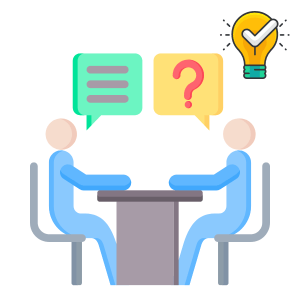7 basic interview questions and answers for freshers
Here are 7 basic interview questions and answers for freshers to prepare for. Starting a new career can be both exciting and challenging, and job interviews are a crucial part of that process. To assist you, here are seven commonly asked interview questions for fresh graduates, along with concise answers and helpful tips to remember.

1. Tell Me About Yourself
This question helps the interviewer learn about you. Keep your answer short and focus on your education and any job-related experience.
Tips:
– Talk about your studies and any work experience.
– Highlight the essential skills that align with the job requirements.
– Keep it professional.
Sample Answer:
“I graduated in Business Administration from XYZ University. I did an internship at ABC Company where I learned about marketing and project management. I’m excited to use my skills in a full-time role.”
2. Why Do You Want to Work Here?
Interviewers ask this to see if you’ve done your homework on the company and if you’re genuinely interested in the job.
Tips:
– Research the company.
– Highlight an aspect of the company that you admire.
– Explain how your goals match the company’s goals.
Sample Answer:
“I want to work here because your company is known for its innovative products. I’m excited about the chance to contribute to such a forward-thinking team.”
3. What Are Your Strengths and Weaknesses?
This question checks your self-awareness. Be honest but positive.
Tips for Strengths:
– Choose a skill relevant to the job.
– Give an example.
Tips for Weaknesses:
– Pick a real weakness but show how you’re working on it.
Sample Answer (Strengths):
“I’m good at organizing my tasks. In my internship, I managed multiple projects and always met my deadlines.”
Sample Answer (Weaknesses):
“Sometimes I take on too many tasks. I’m learning to prioritize my work better.”
4. Describe a Challenging Situation and How You
Overcame It
This question tests your problem-solving skills. Share a real example from your past.
Tips:
– Describe the problem.
– Explain what you did.
– Share the result.
Sample Answer:
“In my final year project, we faced a technical issue. I organized team meetings to find a solution. We worked together and fixed the problem before the deadline.”
5. Where Do You See Yourself in Five Years?
Interviewers want to know about your long-term goals and if they fit with the company.
Tips:
– Be realistic.
– Align your goals with the company’s opportunities.
– Show ambition.
Sample Answer:
“In five years, I see myself as a team leader, helping new employees and contributing to major projects in the company.”
6. How Do You Handle Stress and Pressure?
This question looks at how you cope with challenges. Show that you can stay calm and focused.
Tips:
– Share your stress management techniques.
– Give an example.
Sample Answer:
“I handle stress by staying organized. During my exams, I made a study schedule and stuck to it. This helped me manage my time and stay calm.”
7. Do You Have Any Questions for Us?
Always have a question ready. It shows you’re interested in the job.
Tips:
– Prepare a few questions.
– Ask about the team or company culture.
– Avoid salary questions in the first interview.
Sample Questions:
– “Can you tell me more about the team I’d be working with?”
– “What are the growth opportunities in this role?”
-What opportunities exist for mentorship or guidance for entry-level employees like myself?
Conclusion
Preparing for interviews can feel overwhelming, but practicing these questions and answers can help. Remember to be yourself, stay calm, and show your enthusiasm for the job. Good luck!
By practicing these common interview questions and answers, you can approach your job interviews with confidence and increase your chances of landing your dream job. Good luck!
FAQs
Q: How long should my answers be in an interview?
A: Keep your answers brief and to the point. Aim for about 1-2 minutes per answer. Be concise but provide enough detail to fully answer the question.
Q: What should I wear to an interview?
A: Dress professionally. For most office jobs, this means business attire like a suit or a dress with a blazer. It’s better to be slightly overdressed than underdressed.
Q: How early should I arrive for an interview?
A: Arrive about 10-15 minutes early. This shows punctuality and gives you time to settle down before the interview starts.
Q: Can I bring notes to an interview?
A: Yes, it’s okay to bring notes with key points or questions you have for the interviewer. Just make sure to refer to them naturally and not rely on them too heavily.
Q: How should I follow up after an interview?
A: Send a thank-you email within 24 hours. Express your appreciation for the opportunity and reiterate your interest in the position.
Q: What if I don’t know the answer to a question?
A: It’s okay to admit if you don’t know something. You can say, “I’m not sure about that, but I’m eager to learn more about it.” This shows honesty and a willingness to learn.
Q: How do I handle gaps in my resume?
A: Be honest about gaps and briefly explain them. Focus on what you did during that time that can be relevant to the job, like volunteering or taking courses.
Q: Should I mention salary expectations in the first interview?
A: It’s best to wait until the employer brings it up, usually later in the interview process. If asked early on, you can say you’re open to discussing it as you learn more about the role.
Q: How do I prepare for behavioural interview questions?
A: Use the STAR method (Situation, Task, Action, Result) to structure your answers. Think of specific examples from your past experiences that highlight your skills and achievements.
Q: Can I ask about work-life balance during the interview?
A: Yes, asking about work-life balance shows you’re considering the company culture and your well-being. Just make sure to phrase it positively, like “Can you tell me more about the company’s approach to work-life balance?

